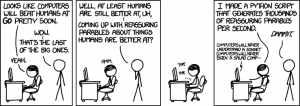In many economics classes, technology is seen as a positive: more advanced technologies being used in production can lower costs and increase efficiency. Firms that are on top of their industry’s respective tech tend to be more successful. People also love technology in their social lives: social media, communication and news are one and the same now, with every aspect of your life weaved seamlessly into one device. While technological advances are seen as positive in most social environments and economic markets, it might not be so great for the job market. According to Michael Osbourne of the Oxford Martin Programme on Technology and Employment, 47% of U.S. jobs are at risk of being phased out by technology over the next 20 years. Osbourne’s study ranked 70 different professions according to how likely they were to be computerized, or replaced by machines. Professions with a probability of being computerized (in the next two decades) of 90% or higher include: telemarketers, watch repairers, models, cashiers, animal breeders, cooks and butchers.
Technological change is all around us. Google and other companies are currently working on self-driving cars. Extensive medical research is going into nanobots that search for and attack cancer cells. A year ago, a breaking news story about an LA earthquake was published by a robot only 3 minutes after it occurred. Dr. Laura Tyson, a professor of Business Administration and Economics at the Berkeley-Hass School of Business claims the evidence is clear, as job growth tends to be happening lower on the pay scale as workers who were once middle-class are phased out by newer tech and settle for underemployment.
Unemployment caused by technological advancements is called structural unemployment, as it is caused by a change in the labor structure of a firm. As a firm advances its technology, production costs decrease as does the need for human labor (and also wages). Factories that ran on the hard labor of thousands of workers 40 years ago now only need a fraction of them to monitor the robotic arms, conveyor belts and sensors that do the same work (arguably) more efficiently and without pay.
On the bright side, robots aren’t super creative – jobs that require creativity and social interaction are pretty safe from computerization. Although job markets in the arts and social sciences can seem discouraging and saturated at times, the robot takeover is predicted to only extend to relatively menial tasks, like making peanut butter, driving a person from point A to point B, or writing short breaking news stories. Osbourne considers these more creative tasks to be more “fundamentally human”, and believes human displacement by machines might prove beneficial for society as a whole. Who knows? Maybe robots will do the boring work for us in the future, while we have another Renaissance.

